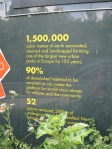In three years, the opening ceremonies of the London 2012 Olympics will take global center stage.
With a world economy on the fritz, tightening the wallets of sponsorship money, London can’t out-glitz Beijing’s 2008 extravaganza. Paul Deighton, LOCOG (London Organising Committee for the Olympic Games) Chief, explained that 2012 would initiate the idea of “inverse one-upmanship,” meaning less flash and more substance.From recycling to transportation, substance takes the form of sustainability in every aspect of the games. When the applause stops and visitors return home, London wants to avoid weed infested ghost stadiums, where only echoes of the athletes can be heard. The over-riding Olympic goal is to “change the way we build, live, work, do business and travel to help us live happy and healthy lives, within our planet’s resources.”
Every contract, design and decision for the London 2012 Olympics will strive to set a new British Green Standard, a continuum that stretches from eliminating wasteful packaging to practicing environmentally smart disposal to designing an environmentally friendly Olympic Flame.
East London, a wasteland of underinvestment, poverty and crime, has been chosen as the site for the Olympic Park. Construction has already transformed the complexion of this predominately immigrant community. Seemingly overnight, the Lower Lea Valley has been reconnected to London for the first time in sixty years. Stratford Station, the debarkation point for the Olympic Park, has had a facelift. To facilitate people-moving, additional cars have been added to the DLR (Docklands Light Rail) and the platform extended to accommodate this expansion.
Inside the station, a bridge has been constructed to conveniently carry passengers to a modern, not yet completed, shopping center. As Adrian Bassett of the LOCOG noted: “As far as moving people, this area will become one of the most connected areas in London.”
Traffic from Europe will benefit from the Eurostar’s door-to-door stop at Stratford. Visitors arriving at St. Pancras Station can take advantage of a quick high-speed, 7-minute shuttle into Stratford. Efficient train service plus bus transport, bicycle and walking paths will keep car traffic out of the Olympic Park, reducing carbon emissions.
Topping the list of sustainable goals is to limit waste and recycle 90% of all demolition materials. Canals that once moved WWII ammunition supplies from factories to transports have been clogged and unusable since the 1950’s. Recently, British Waterways have begun a major dredging project on the canals. Once the contaminated silt is removed, it will be washed and reused elsewhere. Soon, these canals will efficiently transport supplies to the Olympic facilities.
Instead of bulldozing buildings to make room for the Olympic Park, these buildings have been disassembled then reconstructed on alternate sites, recycling materials and reducing waste. New housing in the form of the Athletes’ Village will be sold to the public following the closing of the games, making affordable homes available to area residents.
Once completed, the Olympic Stadium will hold 80,000 visitors.
At the conclusion of the games, the lightweight top section will be dismantled and the steel reused in future construction. What will remain is a 25,000-seat legacy stadium for track and field.
Often, super structures define the Olympics, like Beijing’s Bird Nest Stadium. A more important legacy is how the games influence the people. The games inspire young people to set “I want to do this” sports goals. To facilitate the dreams of the youth, London is planning a new sports college, which will occupy a section of the Olympic Park. Loughborough University, one of the leading UK sports colleges, has expressed interest in operations, making this a winning team of state-of-the art facilities combined with experienced management.
For the people, Olympics 2012 means jobs and business opportunities, not just for the next three years, but for a lifetime. The expertise gained from skills learned today can be taken worldwide to other events and other Olympics teaching the world eco-friendly standards developed for 2012.
The London 2012 Olympics might not have all the Wow affect of Beijing, but the legacy that will emerge will be a cooperative exchange between the environment and our responsibility for environmental stewardship.

![IMG_0434[1] Skeleton of the Olympic Aquatic Stadium](https://gadaboutgals.files.wordpress.com/2009/08/img_04341.jpg?w=300)






Amazing feats we humans can do when they’re needed. Great read!
very useful indeed. appriciate.
added to my fav’ articles.. keep ’em coming.
i guess i should look for blogs more often, the information you gave me here just “fixed me up” with everything i was looking for. THANK YOU!
i rarely reply in blogs, but there is a few that i follow a lot.
thank you for your postings, love them.